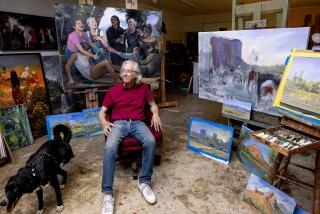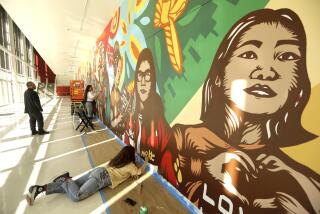Creating a Providential Bridge Between Rich, Poor
- Share via
PROVIDENCE, R.I. — The first sign that things are different at the Olneyville branch of the city library is the colored portraits on the building’s facade.
The enlarged negatives are of people who live in this run-down, forgotten section of the Renaissance City. They are from Guatemala, Cambodia, Peru and Hong Kong. Some look happy, some sad, others distant.
Despite initial resistance, 17 students from the Rhode Island School of Design met Olneyville’s residents and used art to show who they are. Their interpretations--reflected in videos, photos sandblasted onto glass and a light fixture--are on display at the branch library until March 2.
The project’s idea came from David McGee, a painter from Houston who is a professor in residence for the semester in the school’s Art ConText program. McGee wanted to take his students, from privileged backgrounds, into a world they knew little about and to highlight people who live mostly anonymous lives.
“These are people who no one’s going to write about, but who mean something to this community,” McGee said.
Tatiana Gelardi tutored 6- to 8-year-old Cambodian girls at the library, but she wanted more insight into them and other children.
So, for her project, the 22-year-old industrial design major made a set of six cushions arranged in a pinwheel on which children could draw. There, the youngsters could express their feelings through sketches of their family, themselves or anything else.
“What makes this special is their creativity, their energy and absorbing me in what they do,” Gelardi said. The children, besides being friends, give her unfiltered opinions on her design ideas, she says. “They’re always really honest. Either they like it or they don’t.”
The school’s students first visited Olneyville--a poor neighborhood in the southwest section of a thriving city--in September.
They walked through the neighborhood of eroding buildings infested with rats and trash clotted in abandoned lots. Their home base was the library, set in a fading commercial district amid pawnshops, a record store pumping rap music and a porn store in full view from its windows.
Initial Resistance to the Project
Some of the female students were accosted on subsequent trips, McGee said. Many students doubted the project would succeed.
“It seemed ridiculous in a way,” said Devon Butler, a 21-year-old photographer who created the pictorial exhibit on the library’s front. “It seemed like us versus them.”
“There was resistance to it,” McGee acknowledged. “It’s hard to go up and meet people. When you see people walking around and you say, ‘Can I take your photo?’ and they say, ‘Uh, uh, uh ...,’” motioning with his arms as if pushing someone away.
Many of the students chose people associated with the library, said Jodi Apicelli, an employee there. The children participated because they wanted to make friends, and the adults, mainly immigrants, were eager to meet those entrenched in a land new to them, she said.
Others explored beyond.
Howard Rhee chose a 21-year-old employee at the adult bookstore next to the library identified only as Jorge, and created a biography of sorts about him.
Rhee said he was at first intimidated by the assignment.
“Maybe I’m not the most obvious candidate for someone to do that. I could have easily done someone in my everyday walk of life,” Rhee said. “I felt like I wanted to push myself to meet someone I wouldn’t normally have met. I think that’s what David wanted for us to do, to go beyond our comfortable boundaries.”
McGee, 39, has painted oil-based portraits of people he met since coming to Providence in early September. Nine of his works are on display at the school’s museum.
His own pursuit was the inspiration for the class project. He said the students’ creations surpassed his expectations.
“They were empowered by people they wouldn’t have met,” he said. “They discovered their own sense of self by going outside their selves. They not only learned something about themselves, but made friends along the way.”
More to Read
The biggest entertainment stories
Get our big stories about Hollywood, film, television, music, arts, culture and more right in your inbox as soon as they publish.
You may occasionally receive promotional content from the Los Angeles Times.










